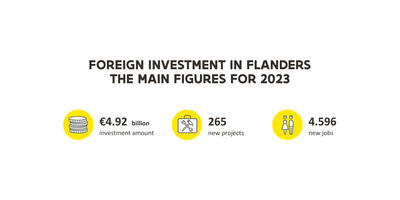
French scaleup to turn CO2 into polyester in Flanders

Fair fabrics
Fairbrics – a contraction of “fabrics” and “fair” – is a scale-up founded by Parisian entrepreneurs Benoît Illy and Tawfiq Nasr Allah. The former is a materials expert, the latter a chemical engineer. In 2019, they started the company with the idea of converting CO2 into common plastics to help fight climate change.
From France to Flanders
Fairbrics has devised an innovative process to convert CO2 into polyester, one of the most widely used fibers in clothing textiles. The scaleup has raised EUR 22 million to build, together with some 13 partners, a pilot plant in Antwerp to test the chemical process in real-life conditions. EUR 17 million is provided through a grant from the EU; the remaining EUR 5 million comes from partners of the Technology Upscaling Project in which the University of Antwerp is also participating.
Why did the French entrepreneurs choose Antwerp? “It is one of the largest chemical hubs in the world, so we are at the source of a lot of CO2,” Illy explains. “Capturing CO2 in exhaust fumes from chemical plants is not an issue. The key question is what you do with that CO2 afterward. We want to use it to make polyester clothing and have a net positive impact on the climate.”
With help from FIT
To find the perfect spot for the pilot plant in Flanders, Fairbrics could rely on the assistance of Flanders Investment & Trade (FIT). “FIT’s team was of invaluable help for realizing this project,” Illy confirms. “They introduced us to key players in the local ecosystem: companies and organizations that have now become our partners. FIT also helped us learn about the legal landscape and gave us a 360-degree view of the advantages and challenges when setting up a new business in Flanders.”
Flanders is the perfect location for this project: it combines a leading carbon capture project, the second largest chemical cluster in the world and offers easy access to the European Market. Moreover, we could really feel the love for chemistry and the textile history of the region.
More to come
Fairbrics’ Antwerp pilot plant, which is scheduled to be operational by mid-2024, should, in the first phase, produce enough polyester to make the yarn for about 1,000 T-shirts a day, or 100 kilograms of polyester. In the second phase – by 2026 – production will increase to 1 ton per day.
“After that, the goal is to build a full-fledged polyester factory, which can convert 50,000 tons of CO2 into polyester every year,” Illy adds. "But such a plant will cost around EUR 150 million. So that will require an additional round of capital.”
Breakthrough project
The figures make it clear that this is a potentially significant breakthrough project. According to a World Bank study, the fashion industry is responsible for 10% of global carbon emissions, more than the total emissions from international air travel and shipping combined. Meanwhile, polyester, a petrochemical-based synthetic fiber, is used in 65% of all textile and clothing applications, especially in winter and sportswear and a lot of outdoor textiles, but also as the base of plastic bottles.
Fairbrics says the cost of making polyester from CO2 is about the same as for the same petrochemical-based material. The secret behind the process are the catalysts developed and patented by Fairbrics to convert CO2 to CO and then react with other chemicals. The company already has agreements with major textile and fashion groups, such as Sweden’s H&M, which is a Fairbrics shareholder, and France’s Aigle.


